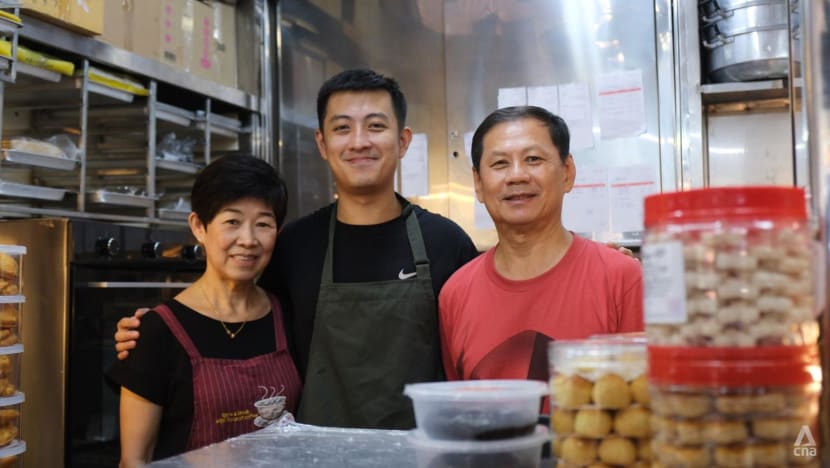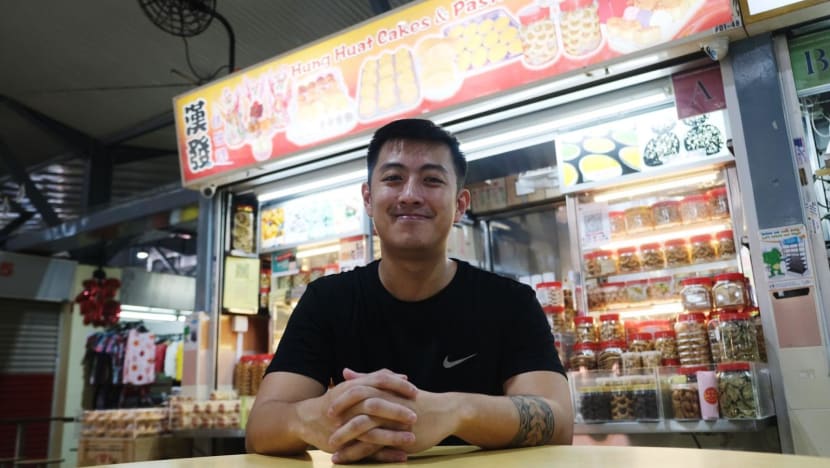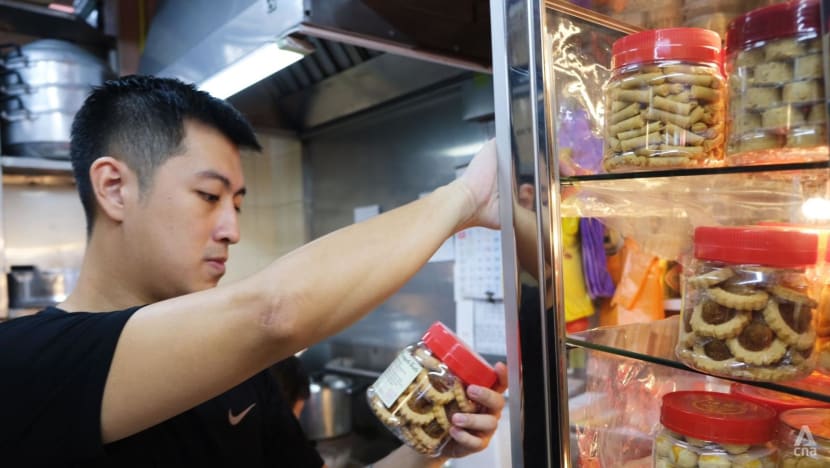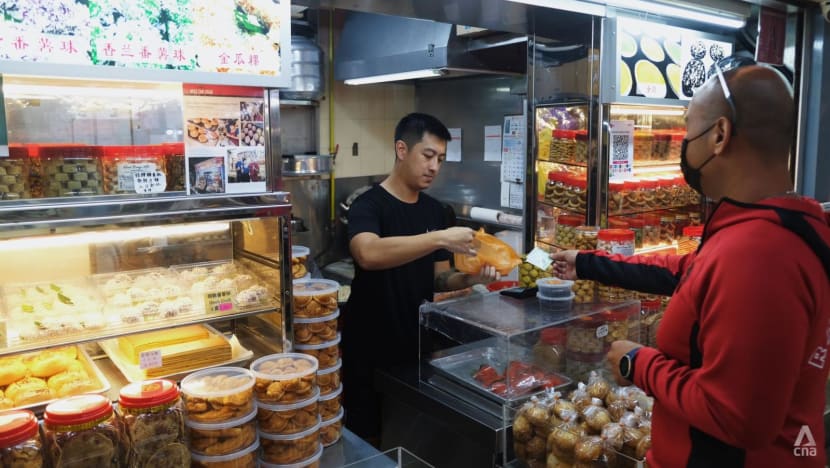IN FOCUS: This 32-year-old went from teacher to hawker, and wants to continue a family legacy
At a time when the sustainability of hawker businesses is in the spotlight, CNA speaks to one man who decided to turn his back on a teaching career to keep his family's pastry stall going.

Sim Weijie (centre) was a teacher for about seven years. (Photo: CNA/Matthew Mohan)
This audio is AI-generated.
- Before hawker centres were developed in Singapore, Sim Weijie's paternal grandfather was a pushcart vendor who sold traditional min jiang kueh
- His parents would eventually take over the reins, starting Hung Huat Cakes and Pastries
- Formerly a teacher, Sim plans to continue in their footsteps
SINGAPORE: Some of Sim Weijie's early childhood memories involved pastries.
Standing outside his parents' bakery at Sims Vista Market and Food Centre with loose change jangling, Mr Sim would have a box of tau sar piah (filled pastry biscuits) in one hand and plastic bags in another.
This would be his introduction to the family business.
"It was a family thing," he recalled. "Everybody started from young, we came here and we helped out."
During the Lunar New Year, Mr Sim would be mobilised to help make pineapple tarts, love letters and prawn rolls with hae bee hiam (spicy shrimp condiment). If the Sim family were making goodies, the whole block would know it, he recalled.
But as his path took him into teaching, little did Mr Sim expect that he would one day be continuing in the family legacy.
FROM HUMBLE BEGINNINGS
Hung Huat Cakes and Pastries started off from a humble pushcart.
Before hawker centres were developed in Singapore, Sim's paternal grandfather was a pushcart vendor who sold traditional min jiang kueh (folded pancakes with various fillings) in the Geylang area.
After the government relocated street vendors like Mr Sim's grandfather into hawker centres, the business found a home at Sims Vista Market and Food Centre, where it remains today.
Mr Sim's parents - his mother, Mdm Liau Cheok Wan was an apprentice at a traditional bakery, while his father Mr Sim Heng Hung was a carpenter - would eventually take over the reins from his grandfather.
The bakery was right beside the carpentry factory, and that was how the couple met. After getting married, they decided to leave their jobs and run the business full-time.
"My mom has the background, and even though my dad wasn't trained as a baker, he loves eating all these things," said Mr Sim.
"So he is always thinking about new ways and things, so together then they started doing more and more pastries. A lot of recipes are actually created on their own."
And along the way things changed. Mr Sim's parents moved on from selling min jiang kueh, and expanded to selling different kinds of homemade pastries.
These days, they are particularly well known for their Teochew mooncakes, pineapple tarts and kueh bangkit (tapioca cookies).
But it was never on the cards that Mr Sim would follow in his parents' footsteps.
"Since young, my parents told me, you have to study … if not you’ll end up like me. They are the very traditional kind of family. So the mindset is always if you don't study, you end up doing things which are very tough. It’s a tough job, you wake up very early, you sweat it out, you work very, very hard, and things like that," he recalled.
"If you study hard, you get a better job, you sit in the air con ... But the funny thing is, now I ended up here."
Mr Sim's journey to teaching had a few "detours" such as spending another year in junior college, he recalled.
"All these I believe added on to my life experiences. I had to experience a few ups and downs, failures and things like that, which I believe made me stronger," he said.
"I feel in a way indebted to very good teachers that I met, (and there were) quite a few of them. Even until today, I keep in contact with them."
Inspired by these teachers, Mr Sim knew what kind of teacher he wanted to become.
"That ... experience forms a large proportion of my teaching belief, the way I taught, the way I spoke to my students and things like that. Without that ... I don't think I'll be able to do what I did in school as a teacher," said Mr Sim, who taught in a secondary school for about seven years.
FIREFIGHTING "EVERYWHERE"
Being a teacher came with its highs and lows, said Mr Sim.
"To say that it's perfect, I'd be lying," he said. "There were things that I really, really loved about the job, but there are also things that I really didn't enjoy."
What he enjoyed the most was his interactions with students, as he was roped into the school's discipline committee. He eventually became a discipline master.
"That was the one thing that kept me going for very long," he recalled. "What really fuelled me is really in this role .. I got to interact with the students, students from really very, very diverse backgrounds."
Getting through to these students brought him satisfaction.
"I felt that I was in the right place, I'm doing what I'm good at," he said. "You've got to have a lot of different tricks up your sleeve. The way you talk to different students ... It's really about the tone, the language and everything - you just really have to be very quick, very flexible."

These interactions taught him a lot, said Mr Sim.
"As a teacher, if you're going in with the mindset that I'm here to teach, I'm just here to impart whatever I have to my students, then I think that's very wrong ... They have their own stories as well, and all these stories will teach us some things," he explained.
But there were struggles, such as the heavy workload.
"While you are really trying to do your best as a teacher to engage the students meaningfully, you have so many other things. Projects, new initiatives, the admin, the sheer admin load and things like that," he said.
"As much as a teacher wants to give their 100 per cent for one student, they struggle, because they have so many people to take care of … It’s really a stop-gap. You are plugging gaps everywhere, you're firefighting everywhere."
Dealing with some parents was also not easy, recalled Mr Sim.
"Another bigger issue that I feel is also the way general adults in Singapore look at teachers, especially when dealing with parents. That is a very, very challenging portion. Sometimes you just feel like you are like the customer service officer," he said.
"It doesn't matter what role you're holding."
As time ticked on, Mr Sim felt that he had achieved what he had set out to do as a young teacher.
"(The goals were to be) the kind of teacher where I feel I am able to inspire. The kind of teacher where I feel I'm able to command a kind of respect not just from my students, but from my colleagues," he said.
A feeling of being jaded also started to seep in.
"I wanted to be fair to my students. I didn't want to be the kind of teacher where I am already slacking, getting a bit laid back, and then at the same time, I’m just waiting to draw my pay every month, waiting for time to pass," Mr Sim explained.
"I didn't want to become that kind of teacher, I didn’t want to shortchange my job."
At the same time, he saw that his parents needed help with the business.
"They were also thinking of retiring but at the same time couldn't bear to let go of the business," he said. And so he initiated a conversation about coming on board.
"It's something that I really want to preserve," Mr Sim said. "And it is something that my parents spent so many years doing, it is a waste to let it go down the drain."
While they were "happy but yet shocked", Mr Sim recalled how his mother was apprehensive at first. She felt that it was a pity he was giving up his job as a teacher and was also worried that working together might affect their relationship.
"My closer friends, even though they were shocked at first when I told them this was my decision … They understood, they knew that this is … something I really want to do," he added

But the switch doesn't mean that he regrets going into teaching. Mr Sim said he would do it all over again, if given a second chance.
"The people I met, the experience I had, the friendship, the bonds that I built with my students and things like that, it is something really I dare say you can’t find many other jobs," he explained.
"So I think that's where teaching is really, really impactful."
"PART OF THE FAMILY"
A trade which was sometimes under-appreciated over the past decades, Singapore’s hawker culture was added to the UNESCO Representative List of Intangible Cultural Heritage of Humanity in 2020.
However, hawkers continue to face numerous challenges including manpower pressures and rising food, rental and electricity costs.
Given such factors, it is more challenging being a hawker now than it has ever been, believes food writer Annette Tan. An added complication is the plethora of dining options which Singaporeans now have, she added.
"To be in the food business in any capacity, you need to have passion. There's no other reason why anybody goes into food, it is such a difficult business to be in," added Ms Tan.
And despite various programmes in place to encourage the uptake of the trade, according to the National Environment Agency (NEA), the median age of hawkers is 60 years old.
However, chairman of the Federation of Merchants’ Associations Singapore’s (FMAS) hawker division Anthony Low believes that more young hawkers are now more willing to enter the trade as compared to when he made the switch two decades ago.
Mr Low left the Singapore Armed Forces 23 years ago to run his father’s ngoh hiang stall. He was 29 then, and no one else would take up the mantle then.
He believes that the inclusion of Singapore's hawker culture into the UNESCO listing has helped to raise the profile of and highlight the contribution of hawkers.
"Now at least people recognise our effort and give us the respect," he said. "It is not a dying trade."
While there are youngsters who start their businesses from scratch, those who take on the mantle of a family business as a "truly rare breed", author of bestselling cookbook Wet Market to Table Pamelia Chia told CNA.
"I have not met many people who come from a line of hawkers, a lot of the young ones that I've come across are starting their own businesses from scratch instead of inheriting them," said Ms Chia, who is also the founder of Singapore Noodles, a newsletter with the mission of keeping Singapore’s food heritage alive.
"When you actually have have folks who truly understand the craft, who have clearly shown that they have taken the time to learn things from their parents, or from fellow hawkers, then I think it's very encouraging for the hawker scene."
At the same time, if nobody takes over these family businesses, or are wanting to learn the trade, it can pose a "huge issue" for Singapore's hawker culture, she added.
"Like everything in life, the hawker centres have to evolve, and Singaporeans have to be willing to accept this evolution," added Ms Tan. "The hawker centre will always be a part of our lives ... but the food that the hawker centre is serving will be different."
The career switch meant that Mr Sim had to take a pay cut, and he also had other concerns such as whether the work would take too much time away from his family.
"I had a lot of family support, from my parents especially and my wife. We managed to find ways to mitigate some of these challenges," he added.
The job is by no means easy. It can be physically demanding and involves long hours, Mr Sim added. During peak seasons, work begins at 6am and ends at about 10pm.
"It is like (a) 14,15 hours kind of thing ... You're standing most of the time. So I say the biggest struggle is actually physical," he said.
"(My parents) are both in their 60s. They do things so fast, so quickly, because they have a system. They are basically like machines … when I work with them, I am struggling to keep up with them sometimes."
Working with family does come with challenges, he admitted.
"There will definitely be disagreements, but I think we've worked out a system. Sometimes to agree to disagree, sometimes to know who is the most experienced, who is the best person to make a decision," said Mr Sim.
"Sometimes (there is) stress to keep up orders, but ... mental health-wise, I think it's definitely better than before when I was a teacher."
There is also a need to cope with rising costs, and added to this is the perception among a minority that hawker food must remain cheap regardless.
"I feel that this can be discouraging for hawkers. Some hawkers really, really use the best ingredients which are not cheap, and they really try their very best to ensure that their food quality is good," said Mr Sim.
"There are still a lot of people out there who are very understanding ... Most of the people they will tell you say: 'It's okay, we understand that your price has to increase, costs are going up. As you continue to sell good food'."
What's been an added benefit is that Mr Sim is not starting from scratch. After all, he has been helping out at the stall for most of his life.
"It is not ground zero," he explained.
"I've always had a taste for pastries. So when I went overseas, I will go for pastries, different pastries shops. I like to try, I like to eat, I also have this very particular taste for pastries, and in a way (certain) standards. So when I make certain things that it's not up to my own standards, I rather throw it."

His previous role as a teacher has also helped him in his job, said Mr Sim.
"As a teacher, you are doing everything. You are doing events, you’re doing management, you’re doing people relationship management," he said.
"Over here as a hawker, you do every single thing. Production, logistics, marketing ... cleaning up, taking the trash out ... I felt in the last few months when I started full time, there are so many things that I learnt. There is growth which is one of the things that makes up satisfaction for me."
There is also a sweet sense of satisfaction that comes with growing one's own business as well as when people enjoy your food, Mr Sim said.
And bit by bit, he is also breaking new ground.
On top of making use of social media to market products, he has also introduced creations of his own. One of these new goodies is the Hokkaido Milk Mochi piah, a current bestseller.
"People really like it. The marketing portion is important. Getting the word out, the videos, the photos and everything. That is the thing that first attracts people. After that when they come down, it has to taste good," he said.
Mr Sim hopes to eventually take over in the next few years, and for his parents to finally enjoy a well-deserved break, while helping out at the shop whenever they can.
"There are a lot of family businesses in Singapore but if you are talking about traditional food, pastries ... you’ll see less and less. Because of the nature of the work, the amount of commitment you have to put in, the hard work physically, the challenge. I probably say not a lot of people want to do it," he said.
And skills and recipes are lost, as old "masters" of the trade retire and bakeries continue to close down, he added.
The shop is "part of the family", he added.
"I cannot imagine not having this shop … This business is a place where my family members gather - my aunts, my uncles, my cousins come here and help ... It is a place and an opportunity to gather," said Mr Sim.
"It’s not just a business, It’s part of the family. It’s part of the family tradition, it’s a place where we gather, there are so, so many memories tied to this business. So this is one of the reasons why ... it is worth keeping."





